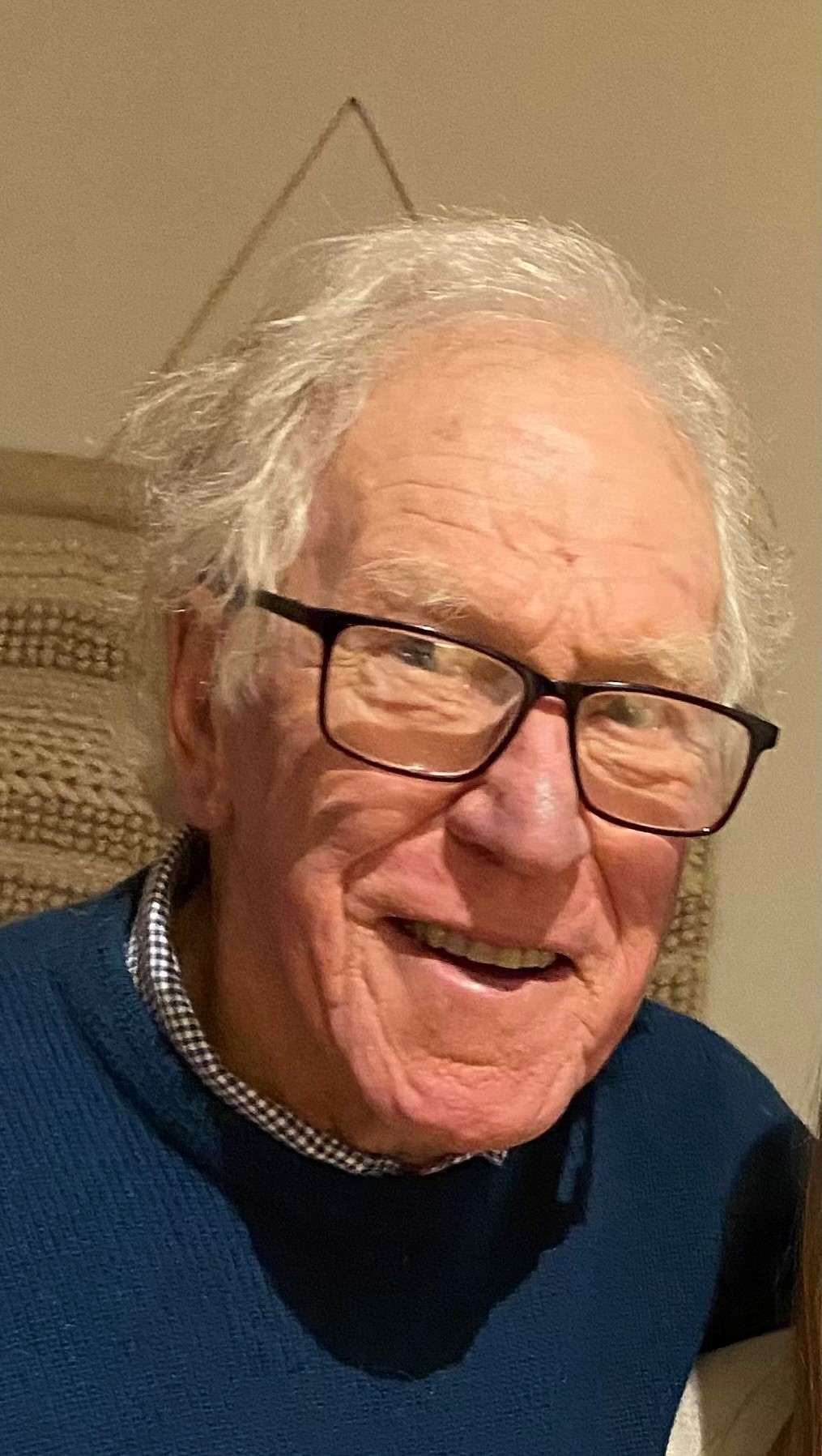<< Back to Lion homepage
Remembrances
Denis McKeeman Oakley OAM (OW1955)
27/12/1937 – 08/08/2022
 Policeman, social worker, minister, footballer, bowler, try-hard sailor, club man, traveller, action man, friend. Denis was the eldest child of Hector Herbert Oakley (OW1926) and Audrey Constance Catterrall. Hector was the son of the Customs-General of Victoria and Audrey the daughter of a Methodist minister. Denis was followed by a sister, Judith, and a brother, Ross (OW1961).
Policeman, social worker, minister, footballer, bowler, try-hard sailor, club man, traveller, action man, friend. Denis was the eldest child of Hector Herbert Oakley (OW1926) and Audrey Constance Catterrall. Hector was the son of the Customs-General of Victoria and Audrey the daughter of a Methodist minister. Denis was followed by a sister, Judith, and a brother, Ross (OW1961).
Growing up in Sandringham, attending State schools, he entered Wesley Prahran at 14 years of age, not academically engaged, and back then, he may have been labelled a 'trouble maker'. His interest was sport. He played football, was a 'basher' as a cricketer, and spent time in the gym supervised by Bonnie Franks. He was Victorian Schoolboy Champion in table tennis in 1954.
The Sandringham train to Prahran was the subject of a number of calls to Wesley, with comments about the misbehaviour of some boys. There was 'Ocka', 'Mency', 'Hammy' - Ian Mence (OW1955), Bryant Ham (OW1956), and at school there was 'Cookie' (Jim Cook OW1955). The 'good' boys were John Moule (OW1955), Geoff Fuller (OW1955) and Andy Mason (OW1954) - all life-long friends. It was in the days of 'the cane' and Denis recalled a number of times in Headmaster 'The Boof' Fredericks' office.
Denis played bass drum in the school band, because he was strong enough to carry it and had a sense of rhythm. He was also in the Glee Club with 'Breath' Brown, singing song words altered with schoolboy humour. The traditions of Wesley and the friendships he made stayed with him always.
After a year in country football and church in Charlton, Denis became a policeman. Attending the local police station with his application to join the Force, the Sergeant slipped another document under his nose to sign. It was a contract with the Sandringham Football Club (SFC), the beginning of his colourful career in VFA football as a full-forward. The press called him 'sandy-haired, stocky spearhead' but the opposing players and supporters had other names. As leading goal kicker for the Club and the VFA multiple times, he was admitted to the SFC Hall of Fame. Following his death, Sandy's football team wore black arm bands, as did the Wesley 1st XVIII, a team which included his grandson Will, in Year 12.
As a policeman, Denis dealt with all sorts of crime and misdemeanors, as well as violence, domestic violence, poverty and child abuse. He realised that the law was not the best approach to many issues and wanted to contribute in a more meaningful way to the lives of children and their families. In 1963, he entered training for Social Work and in those days, not many men trained in that field.
After five plus years in the Force, at Collingwood and St Kilda (tough and challenging areas), Denis surprised many when he decided to candidate for the Methodist ministry and begin at Melbourne University in Arts/Social Work and Theology. 'Theologs', as they were called, lived in Queen’s College. Finally, engagement with – and enjoyment of – studies at age 25. Denis treasured those years as a privilege. Once again, lifelong friendships and tradition.
In 1965, he married Lesley Fielding, a youth worker with the YWCA. After completing his Arts/Social Work degrees, Denis was appointed to the Heathcote circuit as a student minister. It was a year of country parish and country football, with not a lot of focus on theological studies.
A daughter, Kirsten, was born that year. Next parish was Casterton, where once again, country parish and country football took over. A second daughter, Johanne, was born later that year. The move from Casterton to Tally Ho Boys' Village in 1970 sealed the direction of Denis's career in child welfare for the rest of his working life. It was the beginning of professionalisation of child welfare in Australia, with some theoretical and research-based underpinnings being applied to practice. Denis challenged the prevailing institutionalised culture of Tally Ho, grew his hair long as an alternative to the short back and sides imposed on the boys, and didn't always win favour with the residential staff who were quite comfortable with the status quo. He didn't always win favour with the financial manager at the Wesley Mission either!
It was while at Tally Ho that the Grassmere Centre was established. Here boys (some as young as 10) and their families were supported to make changes so some of the boys could safely stay at home, instead of the custom of removal to residential care. During this time, two more children, Rachael and Benjamin, were born and Denis finished his five years at Tally Ho in 1975, with another on the way, Lachlan.
Denis worked in child welfare in Victoria for the next 30 years in an organisation that eventually became 'Oz Child', also making international connections as secretary of the International Forum for Child Welfare. Throughout his career, Denis pushed boundaries, politicians, bureaucrats, fundraising opportunities and helped raise the profile of child welfare issues. He advocated for children and often made a nuisance of himself to achieve his objective. Where he could see children’s needs weren't being met, or there was another way, he was restless for change.
This restlessness was at odds with his love of tradition - The Wesley College and Queens College traditions, and that of the Methodist church; not the theological orthodoxy, but the history and the heroes. He came to an understanding of the value to people of their own cultural theology, and that 'truth' could be found in unlikely places. Not for Denis a set of beliefs, doctrines and dogmas, but what was important was how you lived your life in your relationships and community.
Over the years, he celebrated life's joys, sadness and grief with so many people. He became the alternative parson for people who didn't have a connection with the church. Maybe he made the church seem more accessible because he didn't fit the mould. He upset some in the 1960's when he played football on Sunday or raised money for children by making commercials on TV for Billy Guyatt while wearing a clerical collar.
For seven years from 2007, he worked in the Wesley College Foundation, in the Sapere Aude Bequest program, and finally as Chaplain in Newhaven College on Phillip Island.
Of course, there was also bowls... about 40 years of lawn bowls in the Black Rock and Phillip Island clubs. He loved it and it's no exaggeration to say that he was very competitive.
His musical repertoire was limited to traditional church hymns, Wesley school songs and West Brighton Club songs, which he dearly loved to sing. The West Brighton Club was very dear to him, where he had fun and enjoyed the company of old and new friends. He was very good at writing clever verses on the back of a serviette.
He recalled the story of his last day at school. At the last assembly, the Master Jerry Hattam stood at the door and farewelled each boy as they stepped into their life and their future. His parting words to Denis were, 'Oakley, I hope you can find something useful to do with your life'.
I think we can say that Denis did find something useful to do with his life. He was an agent of change, an entrepreneur with a vision and a warrior for a better life for children and their families. He left behind footprints for the good. He was a big personality who took up a lot of space and engendered much love and laughter. Above all he was a son, brother, husband, father, grandfather, uncle and friend. He often said that his greatest achievement was his family.
He is survived by sister Judith and brother Ross (OW1961), his wife Lesley, daughters Kirsten (OW1985), Johanne and Rachael, sons Benjamin (OW1991) and Lachlan and 17 grandchildren.
Vale Denis McKeeman Oakley, well done.
Contributed by Lesley Oakley and family
